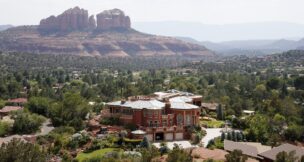Attorney General’s lawsuit against Fondomonte could set new precedent for groundwater use
Howard Fischer, Capitol Media Services//August 12, 2025//
Attorney General’s lawsuit against Fondomonte could set new precedent for groundwater use
Howard Fischer, Capitol Media Services//August 12, 2025//
Key Points:
-
Lawyer for farmers and cities seeks to join lawsuit against Attorney General Kris Mayes
-
Mayes accuses Fondomonte LLC of creating public nuisance by withdrawing too much groundwater
-
Judge will soon rule on whether farmers can join lawsuit as affected parties
Saying she’s trying to overturn decades of settled water law, the lawyer for a group of farmers, businesses and cities told a judge they should be able to join the legal fight against Attorney General Kris Mayes.
Attorney Brad Pew acknowledged on August 12 that the attorney general, to this point, has filed suit against only Fondomonte LLC, with Mayes accusing it of creating a public nuisance because of the amount of groundwater it is withdrawing to grow alfalfa in western Arizona. The result, the attorney general argues, is that the company, a subsidiary of a Saudi dairy producer Alamari, is harming other nearby landowners.
But Pew told Maricopa County Superior Court Judge John Blanchard that what Mayes is doing is a wholesale attack on rural groundwater users.
“This case … is an open attempt to utilize the court system to disrupt long-standing statutory law governing groundwater use in Arizona,” he said.
More to the point, Pew contends — and Mayes does not disagree — that nothing farmers are doing actually violates state water law. And the attorney general admitted she has filed her nuisance lawsuit because the Legislature has failed to enact regulations and limits on pumping in rural Arizona.
What that means, Blanchard said, is that the outcome of Mayes’ unique lawsuit against Fondomonte could set a new legal precedent, one that would affect members of the Arizona Farm and Ranch Group Coalition which represents not just farmers, ranchers and cattle feeders, but also irrigation districts and cities like Holbook, Show Low and Winslow that pump — and rely on — groundwater.
That contention is being backed by Briana Campbell, who represents Fondomonte. She wants Pew’s clients on her side when the case goes to trial.
And Campbell told Blanchard this legal fight is not just about alfalfa, saying that there are other crops grown in Arizona like cotton, that use more water, all of which could be affected by the outcome of this lawsuit.
“If Fondomonte, acting within the law, can be held as a public nuisance by the state of Arizona through the usurping of the Legislature, then so can every other farmer in Arizona,” Campbell said. And she told Blanchard those other operations — the ones Pew represents — also are entitled to be in court to argue that there is no legal basis for what Mayes is trying to do.
In filing suit, Mayes contends that Fondomonte has created a “public nuisance” by pumping so much water it has dried up nearby wells and already resulted in subsidence of the land around Vicksburg in La Paz County. It also says that’s just the beginning, with the damage threatening sediment buildup that reduces water quality and damages appliances, pumps and pipes.
Mayes has already acknowledged that none of that pumping violates state water laws.
There are portions of the state that are within “active management areas” where pumping of groundwater is regulated.
Pretty much everywhere else — including where Fondomonte operates — is ungoverned, meaning that those on the property have the right to grow what they want and, specifically, pump as much water as they need for those crops. In fact, Arizona law says, outside these AMAs, property owners can withdraw and use as much groundwater as they need “for reasonable and beneficial use.”
So Mayes is basing her case on that “public nuisance” theory, one that has never been tested in Arizona in this kind of claim. Pew informed Blanchard that if she secures a favorable ruling, she will have the authority to pursue his other clients, whom he claims are not violating any statutes governing water use in rural areas.
“This case is, for practical purposes, an attempt to nullify or work around long-standing statutory protections for groundwater users under the Groundwater Management Act,” he said.
Mayes already has admitted that if she is successful in using public nuisance laws against Fondomonte, she could use it to go after other large corporate farms operating in areas without pumping restrictions. And she already has her next target in mind.
“Cochise County is being seriously damaged by the Riverview Dairy,” she said, a farm operating in the Willcox Basin when she filed the 2024 lawsuit against Fondomonte. “The evidence of damage is just as strong, if not potentially stronger, than here.”
The lawsuit came after discussions at the Capitol about imposing new rules on pumping in rural areas broke down amid disputes over what regulations are appropriate. And Mayes blames the problem here on “legislative failure to address a water crisis with catastrophic effects on the groundwater level in the Ranegras Basin.”
That failure, she said, was the reason Fondomonte came here to grow alfalfa to feed dairy cattle in Saudi Arabia, where farming of “green fodder” has been banned since 2018.
“Fondomonte is taking advantage of Arizona’s failure to protect its precious groundwater resources,” Mayes said.
So that failure to tighten water laws, she said, left her with the public nuisance theory.
“Arizona law is clear on this point: No company has the right to endanger an entire community’s health and safety for its own gain,” Mayes said when she filed suit.
Arizona’s nuisance law has two methods of enforcement.
One makes it a Class 2 felony to maintain a public nuisance. But with the defendant being a limited liability company, jail time is off the table. That leaves only a fine of $750 that would make no difference in a case like this.
The other, though, allows her office to ask a court to enjoin the activity. That is precisely the order she wants here as well as a requirement for Fondomonte to set up an “abatement fund” to reimburse others who have been affected.
Pew said he wants to make the case that Mayes is not entitled to play with the gray area around existing water law, not just when it involves Fondomonte, but when what she is arguing affects other farmers, ranchers and cities.
“Groundwater users, including my clients, have dedicated substantial resources to developing groundwater resources in reliance on the Groundwater Management Act,” he told Blanchard.
“The Arizona Attorney General brought this lawsuit because it perceives a legislative failure in how the Arizona Groundwater Management Act regulates rural groundwater use,” Pew said. “That should be a legislative debate, not a judicial debate.”
For the moment, though, Mayes wants to keep the legal arguments limited to Fondomonte, saying there is clear evidence of the effects of the company’s operations.
Operating in the Ranegras Basin since 2014, she said the company has multiple wells, each capable of pumping up to 4,000 gallons of water per minute. She said, in 2023 alone, Fondomonte used about 31,196 acre-feet of groundwater within the basin. That is considered enough to serve about 93,000 single-family homes.
But the attorney general said there are more immediate and visible consequences.
Mayes said a well less than a mile from Fondomonte’s properties went dry about five years ago. And in late 2017, the same happened to a well for the Friendship Baptist Church about 1.8 miles away.
“The land is literally sinking in La Paz County with as much as 9.8 inches of subsidence documented in the immediate vicinity of Fondomonte’s farms,” she said.
All this, said Mayes, is enough to fit within the legal definition of a “public nuisance,” even if the company is not violating any other laws.
Blanchard promised a ruling in a few days on whether Pew’s clients will get to participate in the lawsuit. But whatever he rules, no date has yet been set to hear the arguments.












































